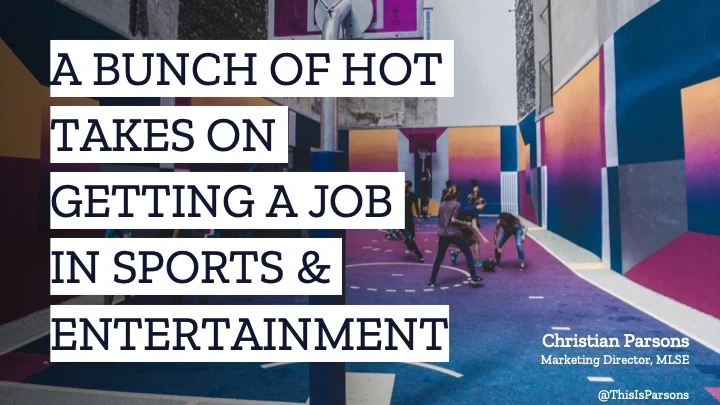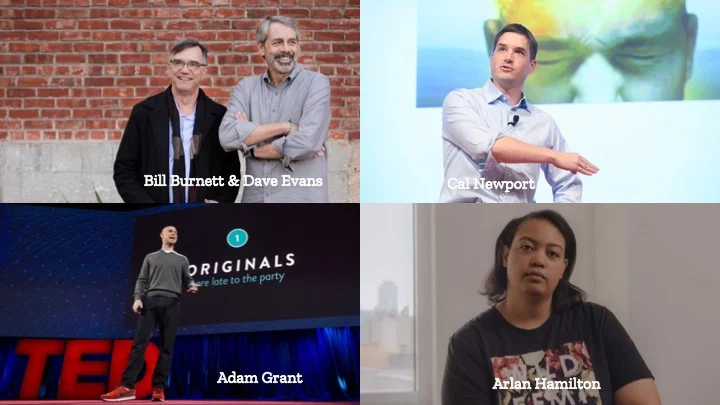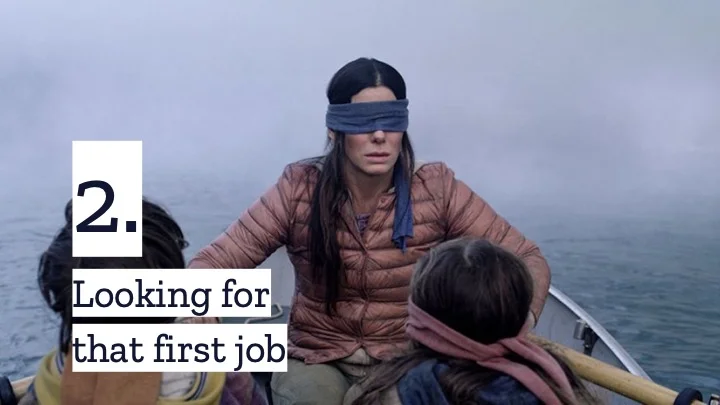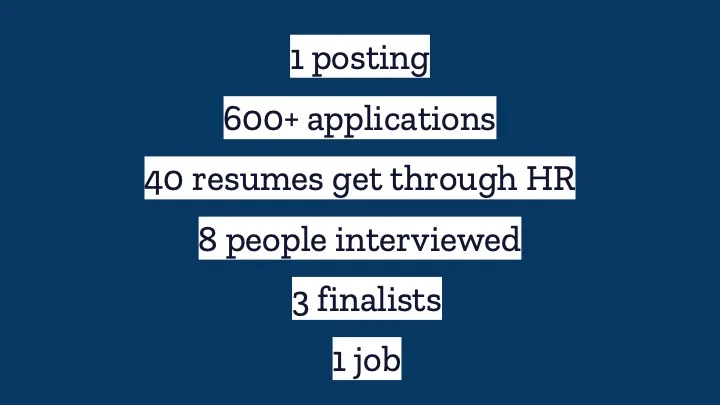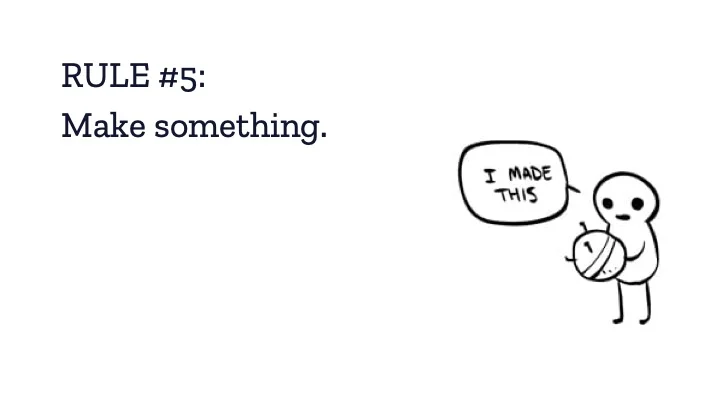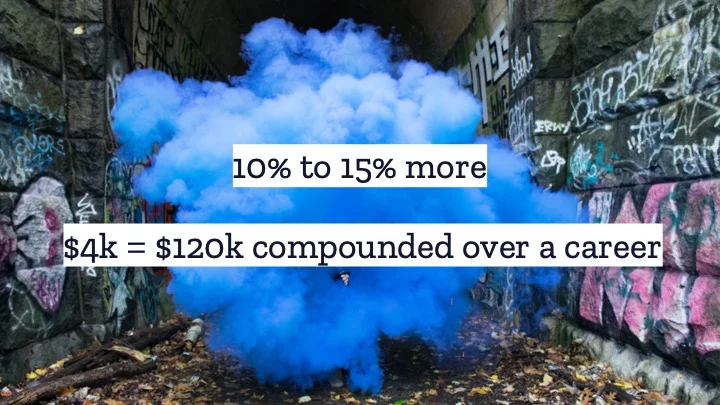Over the weekend, I was fortunate enough to give a keynote at the Ryerson Entertainment Conference in Toronto. The audience was filled with bright young minds eager to break into the world of music, fashion, graphic design, broadcast, sports and entertainment.
They spent the weekend devouring programming that went deep into the industry trends for music, theatre, live events, gaming, digital media and more.
The organizers were kind enough to give me free rein in terms of the topics they were looking into. There was a suggestion that I talk about innovations in the industry, what would be coming next and stuff like that.
But then I asked myself a question - is that what students really care about? I mean - yes. They are hyped about their industry. They are excited about knowing what’s coming next in their field. That’s why they’re at the conference!
But you know what else is exciting? Getting a fucking job. Going from paying money to learn about an industry you love to making money from working in that industry.
So that’s what I talked about. And here’s what I said:
All the confidence. None of the research.
I’m here to give you a bunch of hot takes how to get your first job in sports & entertainment. Why hot takes? Because they’re my opinions - designed to be provocative, only lightly researched, and emotionally charged from my own personal experience.
Why Listen To Me?
Great question. Great, great question. I’m not smarter than you. I’m not sitting on genius level IQ. I don’t have a higher learning capacity. I have not cracked the code to a larger storage capacity in my brain. I’m not a scientist with a depth of lab experiment data to draw from. Everything I know is from my own learning and has been applied with a sample size of n=1 … that 1 being me.
The only qualifications I have to talk to you about breaking into these industries are my own life experiences. I’m 35. And I’ve spent the past 14 years working in creative industries - advertising, sports, fashion, music & live entertainment. The insights that I am bringing are from my own personal experience. So please take everything that you hear today with a grain of salt. Some of it might apply to you. Some might not. Take the ideas that you find valuable and discard the rest.
And if you’re this far in and kind of feeling sleepy, here’s people to read / follow / reach out to that are MUCH better qualified than me:
A bunch of people a whole lot smarter than me.
1/ ON LIFE DESIGN: Bill Burnett and Dave Evans - two profs from Stanford who teach an undergraduate course on Life Design. They dive deep into applying design thinking to make sure you create the full life that you want - not just the career. It’s the most popular course on campus.
2/ ON WORK LIFE: Adam Grant is an organizational psychologist from Wharton who spends his time diving into the nitty gritty of work. Everything from getting hired, to getting promoted, to workplace bias and creative industries. He has a great podcast in partnership with TED.
3/ ON CREATIVITY & DEEP WORK: Cal Newport is prof at Georgetown. (Yes, I know … another one. Sorry about that). He wrote about deep work and the ability to focus without distraction on a cognitively demanding task. He talks about getting the hard work done and ignoring distractions to create great creative outputs.
4/ ON GRIT & GETTING YOURSELF OUT OF THE SHIT: Arlan Hamilton was broke and homeless 4 years ago. She’s also black, a woman, a lesbian … and a certified badass. She got pissed off at the amount of startup capital that goes to white dudes in Silicon Valley. For every $1.2 million that a white man raises in a seed funding for their innovative company, a black woman raises $46,000. That’s fucked up. So she started Backstage Capital, which has already invested $4 million in women and has raised $36 million more over the past year.
If she can go from the couch to the boardroom, so can you.
1/ WHERE DO YOU WANT TO GO?
The first question that I want you to ask may seem obvious - where do you want to go? It’s okay if you don’t know. You may have five directions that you want to go in. I want to be a graphic designer. I want to direct music videos. I want to play guitar in a rock band. I want to be a music promoter. No wait … I want to be the world’s best vegan chef. You have all these ideas, but you don’t know which one is the right one. I’ll help you out with this one.
There is no right answer. Let me repeat that again. There is no right answer.
There is no right answer. Especially when you don’t have real data. You don’t actually know if you would like any of these career paths. So, how do you get out there and gather data? You need to craft experiments to find out the stuff that you like.
Oh shit! I like cooking food. Or at least watching it on Netflix. Great. What does it actually cost you to test that? To create it? It’ll cost you a tripod, some lights and some food. Now go make a shitty show and put it up on YouTube. Practice your on camera personality. See if you enjoy the process of learning, creating and perfecting that craft.
I want to work in advertising. Shit! That’s both easy and hard. Go take an internship and see if you like what the fuck is going on in those places. Do you like the creative atmosphere and solving tough brand problems? Or do you think it’s all a sellout artistic wank? Either way, now you know.
I want to be a music promoter. Fucking awesome! Go hang out with a bunch of them and ask them about their career paths, their lives, what they love and what they hate. They love building an artist. They love the show. They hate shitty artists. And losing money. And they ride or die by the risk of each show. Now figure out if that’s something that you could deal with.
Get out of your head and into the real world. Create opportunities to collect data that can help you decide which path you want to take. And then point your skis downhill and start your run.
It’s okay to change course. The biggest fear of picking a path is that you’re shutting the doors on the other opportunities. But here’s the thing - it’s okay to change course down the road. The choices that you make throughout your life are not permanent. They are always up for revision. But having a focus allows you to drive down a specific path and see if it’s right for you.
Making that choice can be helpful in a number of ways. It can be as simple as telling you where you need to be. I want to be an actor? Shit. I’ve got to be in Toronto or LA. I’m not going to be super fucking successful in the booming film industry of Thunder Bay, Ontario.
This is about building a career, not just your next job. The first step on your journey is knowing where you want to go. Being in at this conference, a lot of you have already picked that. Or you might be treading water trying to figure it out. It doesn’t matter. Having direction is key. Otherwise, you’re just wandering around.
It’s like fucking Bird Box out there.
2/ LOOKING FOR A JOB
This is the shittiest part. You’re put out there with no clear idea of what to do. Your career counsellors are telling you to do stuff … but if they haven’t worked in the industry, they don’t actually know what the fuck goes on. They tell you what to do, but not how to do it.
Here’s the harsh reality of your chances:
These are real numbers when we posted for a coordinator to work on the live music business.
Those are some slim odds. For a job that you actually hear about. That’s why you need to invest in your a network. Because I’ll tell you straight … when we get post jobs at MLSE we get lots of applicants. Over 600+ applications in a week and a half. Our HR might try hard, but they’re human. Either way, there is a thin margin to come out of those submission. If you know someone, you’re automatically put into the top 40 that actually get to the hiring manager’s desk. You just went from 1 of 600 to 1 of 40.
If you can’t do this, you’re fucked. Invest in your network.
Informational interviews.
Every career counsellor you’ve talked to told to do them and that they’re useful. And I agree. You need to leverage them to build your network. Every single person in our industry was in the spot that you are now. You know why? Because recruiting in creative industries is fucked. There is no efficient pipeline. There is no clear path or career fairs. So every person who is established in the industry and you want to meet … they had to do the same thing.
Rule #1 : AVOID HR
See this person? Her name is Samantha and she works in Human Resources. FUCK SAMANTHA! Her job is to say no. I’m sure that there are a lot of amazing recruiters in creative organizations, but they are fucking few and far between. Most HR people say no as a blanket statement. They think that it’s their job.
When I was starting out trying to get an internship in advertising, I reached out to the top 50 ad agencies in Toronto through their HR reps. Zero got back to me. Zero. Then I decided to reach out directly to the presidents of the ad agencies. Roughly 60% of them got back to me. ARE YOU FUCKING KIDDING ME? The president of an agency has more time for me than HR? If that’s not a lesson in what’s fucked with recruiting, I don’t know what is.
But the lesson is clear. Avoid HR. Avoid. Avoid. Avoid.
Reach out directly to people in your industry that you want to talk to. Interns that got hired. Junior people. Senior people. Even the fucking president or the founder. Doesn’t matter. Ask them.
Rule #2 : HAVE A CLEAR ASK
You want to have a clear ask. You don’t need to go into depth when you’re trying to set up the meeting, but when you meet in person, take control of the meeting. Explain why you’re there, what you’re looking for, and what you would consider success from the meeting. Otherwise you’re going to get stuck with getting asked the question “so tell me about yourself”, ten minutes of small talk and an awkward exit.
Rule #3: DO THE WORK
This is may sound stupid, but make the plans. Give them options. Figure out where their office is and pick a couple of places for them to chose from. Make it super fucking easy for them to say yes without having to do any other work aside from showing up. Take charge. It’s not an asshole thing to do. It’s removing decisions from their plate. It makes meeting with you less of a pain in the ass.
And be prepared. Do your research. Check out that person’s LinkedIn to learn about their career path. Do a Google search to see what news articles they are mentioned or quoted in. See if you can find any previous videos of interviews they’ve done.
And please for fuck’s sake come in with a list of questions. And listen to the answers. And do NOT have one of them be “Can I have a job?”
Pro Tip - If you’re looking to generate some good insights from a professional, ask them this question - what would you do if you were in my position? Write it down.
Rule #4 - DELIVER VALUE
80% of people go in with a list of questions. And that’s good. You need to be fucking prepared. But what is going to make you stand out from everyone else? Deliver value. You need to figure out a problem that they have (before you show up) and do some thinking on solving it.
Research their business. Their brand. Their industry. Identify a problem that they are facing and talk through solutions with them.
Rule #5 - MAKE SOMETHING
What does that mean? Make something. Anything. It could be art. It could be a playoff edit for their sports team. It could be a strategy. It could be a revised UX or prototype of their app. But you need to make something.
And if you don’t know what to make, bring insights. What do I mean by that? Take whatever product that they have and ask five of your friends about it. Cut it into a 30 second video and play it for them. This gives them insights as to what your peer group think of their product. Or even better … talk to the people who actually are their fans.
Your goal is that you want the person to walk out of the meeting knowing something that they didn’t know going in … and even better, having something that they can share with their colleagues. And that artifact has your name attached to it.
Rule #6 - MAKE A PERSONAL CONNECTION
That doesn’t mean that you fake having something in common - you don’t have to pretend to love the same band or sports team as them. You just have to be interested in the other person. Be strategic in your conversation to pull out personal details about their story, ambitions and career. Why did they get into the field? Oh music. That’s cool. Who was your first live concert? Michael Jackson on a tour in 1998 in Vancouver? Sweet. And your stupid cousin took the floor seats while you were in the nosebleeds? That sucks!
The connection you’re trying to build isn’t about you telling your story and trying to be interesting. It’s about having that person talk about themselves, being able to relate to them and gathering information. It’s going to be useful in the next step. I promise.
Rule #7 - FOLLOW UP
Do you send a follow up email or text? Of course you do. But then you do something that stands out. You send a gift and a handwritten note as well. Why? Because people get hundreds of emails a day. But they get less than a dozen pieces of mail a week.
And as for the gift, it can be anything. Something small, but personal. Something that says “Hey, I was listening to our conversation”. They talked about missing bagels from when they were living in Montreal? Send them some Montreal bagels.
It doesn’t have to be expensive or extravagant. But it does have to be personal.
Drinks are on you.
3/ YOU GOT A JOB OFFER!! FUCK YEAH!
You’ve gotten presented with an offer. Or maybe even multiple offers. Fuck yeah! You start dreaming. Welcome to being able to afford the finer things in life. Hello rich people? I’m one of you now. That’s right. I’m going to order off the normal menu, not the dollar menu.
But my first question is this - do you actually want this job? There is no such thing as a perfect job. I’m not telling this to you in order to lower your standards and get you to do shit that you don’t want to do. I’m telling you this so that you can make a rational choice about the opportunities that you want to accept.
When you’ve been looking for a job for a couple of months, all of sudden you might be thinking that telemarketing is technically marketing. And sure, the a job at a call centre isn’t exactly in your wheelhouse, but you could make it work. Or being a bank teller is stable and does have a path to advancement.
Fuck that.
Here’s the cold hard truth. Nobody gives a shit about your career as much as you do. Let me repeat that. Nobody gives a shit about your career as much as you do. Not your employer. Not your boss. Not your friends. Not your parents. Sure, they might care about aspects of your career. Your employer wants you stay with them at a low cost. Your boss wants you to add value to the team. Your parents just want you to have a fucking job. Any job.
But this is not about having the perfect job. It’s about the next step in building your career. So the questions I ask you are:
Will you be able to stomach the lifestyle with this job? (Hours, money, travel, commute, social life)
Will this job set you up for the next one? (Skills, education, brand, experience, network, exposure)
Negotiate your offer.
When you get an offer, negotiate. You think that you don’t have leverage. This is your first job in the industry. You’re entry level. It does not matter. Negotiate. You do have leverage. They picked you. They invested time and chose you out of a pool of hundreds of candidates. It doesn't hurt to ask for more money. The worst thing they can say is no.
A good rule of thumb is to ask for 10% to 15% more. Nobody is going to take back a job offer if you’re asking within that range. And most HR has unilateral ability to flex between 5% and 10% without asking anyone.
The best part is about negotiating your first offer is that this is the foundation for your career. It compounds over time. Sure, asking for another $4k on a $40k offer seems risky to you. But getting an extra $4k now can equal over $120k over the course of your career. That’s a lot of money.
The average person switches jobs 12 times over the course of their career. And if you negotiate the offer every time you switch jobs, you’ll be netting out millions of dollars ahead of someone taking the exact same path that never done that. This is especially important for women, who are less likely to do so. The majority of offers are delivered via email. Leverage the impersonal nature of the medium and polite written words to conjure the courage to fight for more. You deserve it.
(For a more detailed breakdown of how to negotiate job offers, I recommend the Alex Kouts interviews on the Jordan Harbinger show).
It happens to the best of us.
4/ SHIT. WHAT IF I DON’T GET A GOOD JOB RIGHT AWAY???
Look, there is value in unpaid or low paid. But you need to know what it is before you do it. Don’t just take an unpaid gig of stuffing envelopes just because you don’t think you have anything better to do. You would be better served building your skill stack and working on unpaid projects for yourself.
Do not take an internship if you don’t know what you’re getting out of it. Maybe having the name of the business on your resume will make you more appealing to other places. Maybe it’s the network that you would meet there. Maybe it’s insight into an industry that you are interested in, but know nothing about.
There are three reasons why you should accept an unpaid gig:
You will be close to the crown. You work as an assistant to someone influential in the organization or the industry. That lets you get invited into the rooms where the decisions get made. You listen, you learn and you meet people. You are in their orbit and work hard to absorb as much as possible.
You will build you skill stack. You will acquire new skills that are in demand in your industry. Editing. 3D modelling. Copywriting. Using the Unity engine for augmented reality. And you will learn and get feedback from experts in their field.
You will make stuff. You will come out of your internship with new work in your portfolio. These are examples you can leverage to show other places the impact that you can have on their business. The work that you can do. And place a premium on work that they can see in the real world.
CONCLUSION
Careers don’t happen in straight lines. There is no singular path to take or ladder to climb. So don’t think in a linear fashion. Think about the smart way in - the path of least resistance.
You can develop a deep skill set in augmented reality and then apply it to your favourite sports team or band. You don’t need to grind from the bottom for 10 years at the same organization moving up each rung on the ladder. Be smart and gain a variety of experience instead of a depth of experience of how one organization runs.
And one last thought: always be learning. Always work to improve your skill set. School doesn’t end when you get your degree. It’s just self directed.
- Christian

